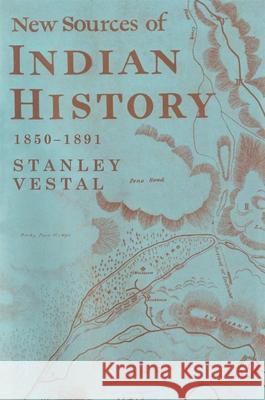New Sources of Indian History 1850-1891: The Ghost Dance - The Prairie Sioux A Miscellany » książka
New Sources of Indian History 1850-1891: The Ghost Dance - The Prairie Sioux A Miscellany
ISBN-13: 9780806148175 / Miękka / 1934 / 402 str.
New Sources of Indian History 1850-1891: The Ghost Dance - The Prairie Sioux A Miscellany
ISBN-13: 9780806148175 / Miękka / 1934 / 402 str.
(netto: 78,77 VAT: 5%)
Najniższa cena z 30 dni: 82,03
ok. 30 dni roboczych
Bez gwarancji dostawy przed świętami
Darmowa dostawa!
More than a century has passed since that winter morning in 1890 when the Indian police killed Sitting Bull and destroyed the power of his great Sioux Nation. Yet only recently were the facts about Sitting Bull and the Sioux being sifted from the fables that have grown up in the interim. In New Sources of Indian History, Stanley Vestal traced scores of historical threads, obtained firsthand, which helped reveal the fabric of Sioux life, warfare, and relations with the whites from 1850 to 1891. This miscellany brings together the many phases of existence the Sioux knew when buffalo still roamed the shores of the Missouri, and that they lost when Indian agencies and military posts replaced the council fire. More than a series of episodes hung on the thread of time, this book portrays a many-colored pattern of American Indian personalities-from Sitting Bull, the leader of a mighty warrior society, to Black Bull, the Indian trickster, who would have sold Sioux lands to whites by the pound. For readers of Vestal's Sitting Bull (1932) this volume presents proof of the facts set forth in that remarkable biography. Volume 7 in The Civilization of the American Indian Series Stanley Vestal is the pen name of Walter S. Campbell, who up grew up in Southern Cheyenne country. A graduate of Oxford University and long-time Professor of English at the University of Oklahoma, he wrote many distinguished books on American Indians and the West, including Sitting Bull, Champion of the Sioux.
More than a century has passed since that winter morning in 1890 when the Indian police killed Sitting Bull and destroyed the power of his great Sioux Nation. Yet only recently were the facts about Sitting Bull and the Sioux being sifted from the fables that have grown up in the interim. In New Sources of Indian History, Stanley Vestal traced scores of historical threads, obtained firsthand, which helped reveal the fabric of Sioux life, warfare, and relations with the whites from 1850 to 1891. This miscellany brings together the many phases of existence the Sioux knew when buffalo still roamed the shores of the Missouri, and that they lost when Indian agencies and military posts replaced the council fire. More than a series of episodes hung on the thread of time, this book portrays a many-colored pattern of American Indian personalities-from Sitting Bull, the leader of a mighty warrior society, to Black Bull, the Indian trickster, who would have sold Sioux lands to whites by the pound. For readers of Vestals Sitting Bull (1932) this volume presents proof of the facts set forth in that remarkable biography. Volume 7 in The Civilization of the American Indian SeriesStanley Vestal is the pen name of Walter S. Campbell, who up grew up in Southern Cheyenne country. A graduate of Oxford University and long-time Professor of English at the University of Oklahoma, he wrote many distinguished books on American Indians and the West, including Sitting Bull, Champion of the Sioux.











